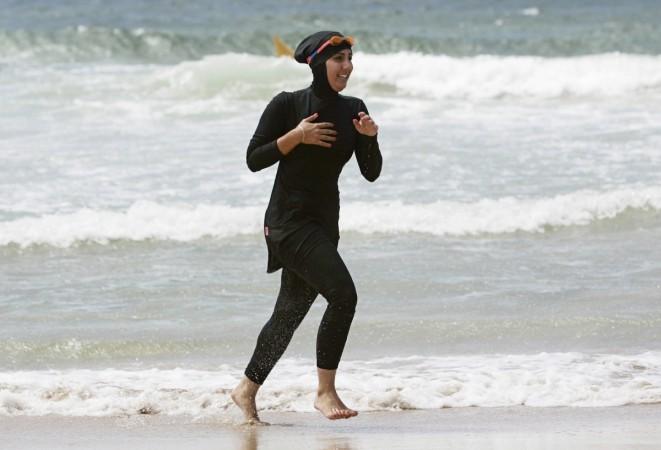
Communal tensions loom high in France, as three Mediterranean towns - Cannes, Villeneuve-Loubet and Sisco on the island of Corsica - have banned the 'burkini' and and Le Touquet on the Atlantic coast is planning to do the same.
What is a Burkini ?
The word 'burkinis' which is an amalgamation of the words "bikini" and "burqa," denotes a full-body swimsuit, which can be described as a wetsuit with a hood. It's been designed to cover all parts of the body except for the feet, hands and face and yet be form-fitting but loose enough and practical to swim in. Its origin is traced to cater to the strict modesty dress codes that are typically adhered to by Muslim women.
Burkini's made headlines back in 2011, when non-Muslim journalist Nigella Lawson wore one to Australia's Bondi Beach. Speaking to the telegraph, Lawson's spokesperson explained that she wore the garb for sun protection, while adding that "Nigella was protecting herself from sunburn, nothing more than that."
The swimwear also attracted commercial interests after British mega retailer Marks and Spencer began selling the suits.
Why is France's ban on Burqas and 'Burkini's' controversial?
France, which has the largest Muslim minority in Europe, estimated at 5 million, in 2010 introduced a somewhat controversial ban on full-face niqab and burqa veils in public, as they argued that it defies French laws on secularism. Lots of protests occurred in the aftermath of the ban that began being enforced from 2011.
Those arguing for the ban, say that face-coverings prevent the clear identification of a person, which is both a security risk, and a social hindrance within a society which relies on facial recognition and expression in communication
While arguing against the ban, many say that it encroaches on individualistic freedom, encourages Islamophobia and encroaches on right to practice religion freely.
How is the new Burkini ban being defended?
The conservative mayors who have imposed the ban cite the same argument to defend the ban. Though some cite democratic principles, others such as mayor of Villeneuve-Loubet, Lionnel Luca, view it in as an 'ideological provocation.'
"Since the Nice attack, the population is particularly sensitive," Lionnel Luca, member of the hardline, Droite Populaire faction of the conservative Les Republicians party told Le Parisien. Luca added that the burkini raised hygiene issues and could make rescue at sea more difficult.
Mayor David Lisnard of Cannes also stated that the burkinis could create "risks of trouble to public order."
"The burkini is not some new line of swimwear, it is the beach version of the burqa and it has the same logic: hide women's bodies in order to better control them… It is not just the business of those women who wear it, because it is the symbol of a political project that is hostile to diversity and women's emancipation," Laurence Rossignol, the socialist government's minister for women's rights, told French daily Le Parisien in an interview, while admitting that the ban has sparked tensions on French beaches because of its political dimension.
Recent incident reflecting simmering tension
A large brawl took place on a local Corsican beach, Sisco, where a family of North African descent started to fight with locals, after a tourist took pictures of women bathing in burkini, inciting a near riot in the area leading the mayor to ban the burkinis on Monday.
Responses against the ban
The Collective against Islamophobia in France (CCIF) on Tuesday filed a complaint against the bans with the Conseil d'Etat, France's highest administrative court, which is expected to hand down a ruling in the coming days.
"This summer we are witnessing a hysterical political islamophobia that pits citizens against one another," Marwan Muhammad, CCIF spokesman said, while adding that the bans restricted fundamental liberties and discriminated against Muslim women.
















